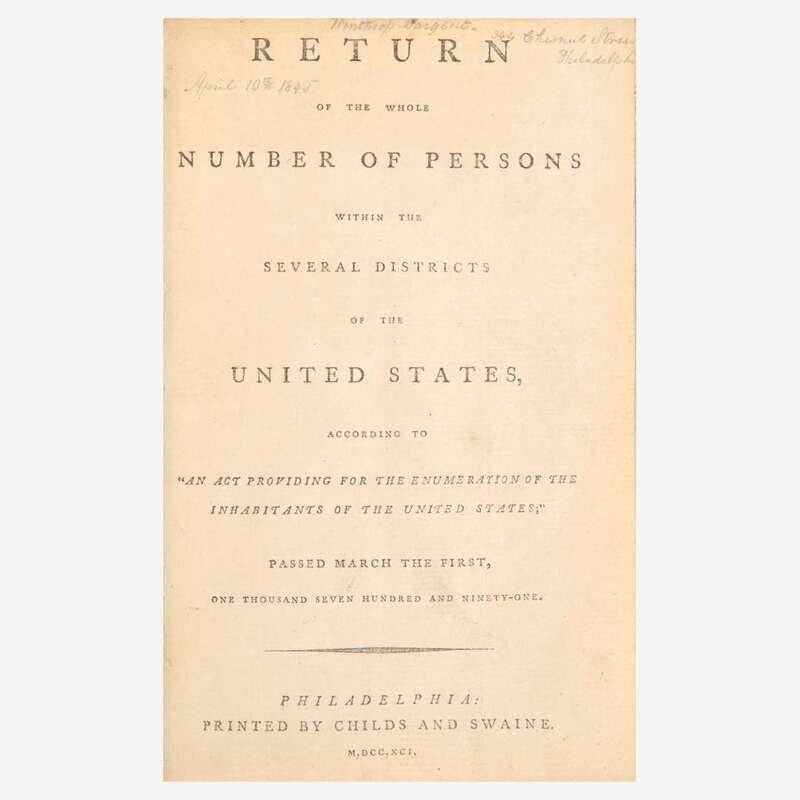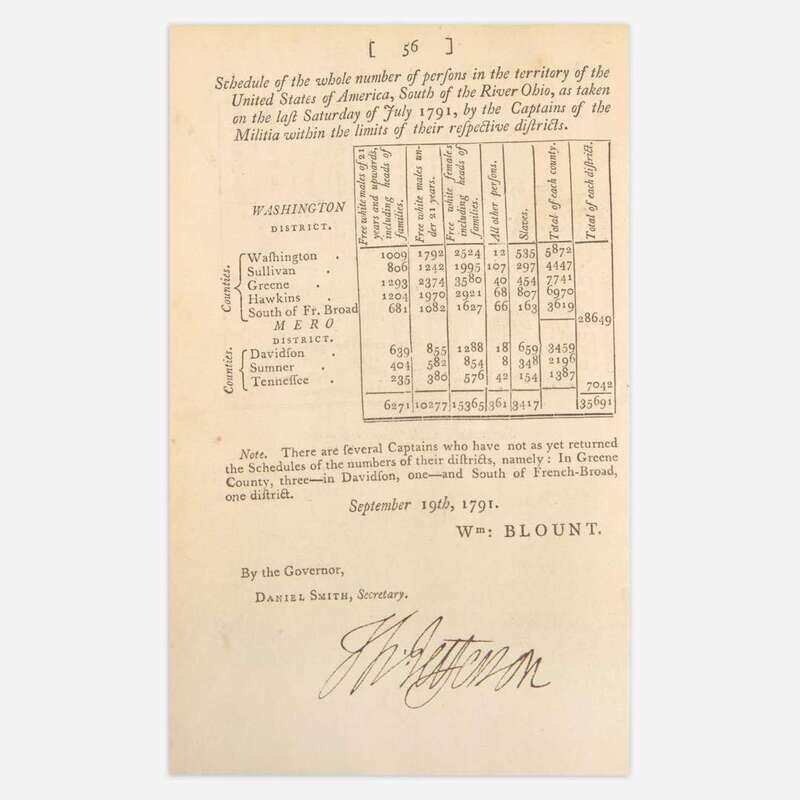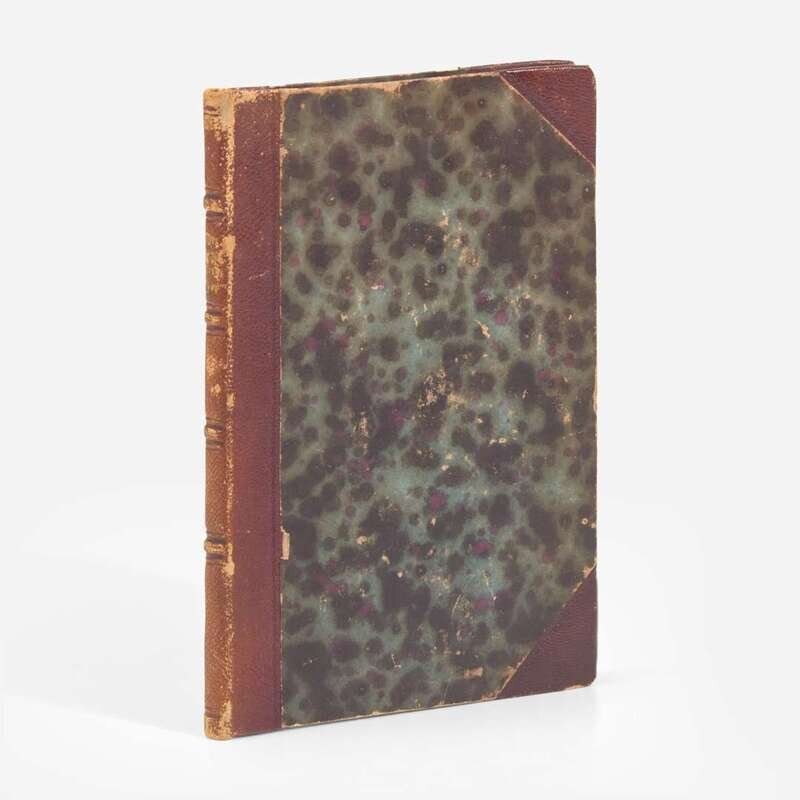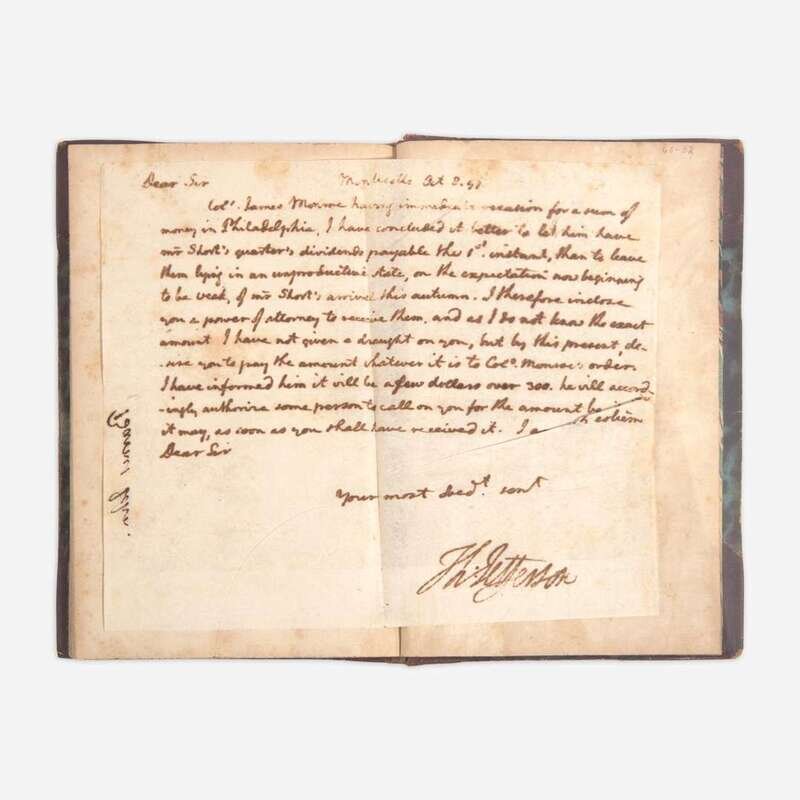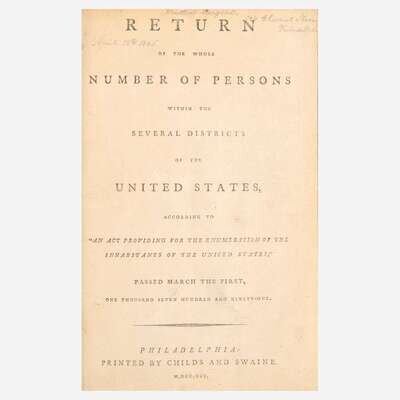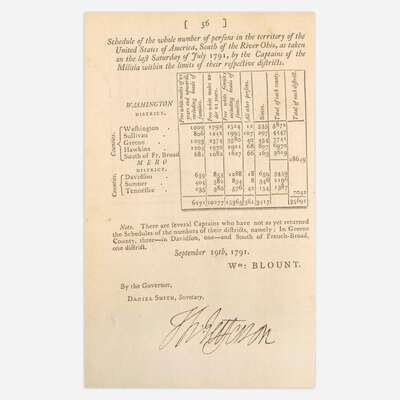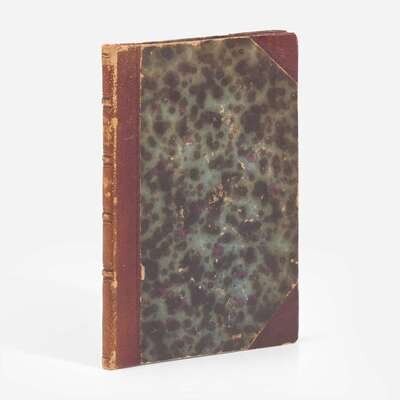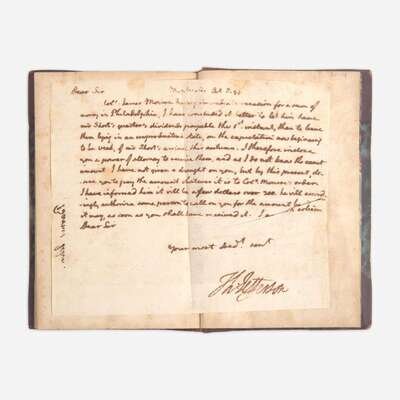Condition Report
Contact Information
Lot 18
Lot Description
First edition of the first United States census, signed by Thomas Jefferson
Philadelphia: Childs and Swaine, 1791. First edition. 8vo. 60 pp. (pp. 33/34 and 35/36 in duplicate). Boldly signed by Thomas Jefferson, as first Secretary of State, at bottom of p. 56, certifying the enclosed data. Nineteenth-century three-quarter brown morocco over marbled paper-covered boards, stamped in blind and in gilt, extremities and boards rubbed; all edges trimmed; marbled endpapers; from the library of Jefferson's great-great-grandson, Thomas Jefferson Coolidge, Jr., (1863-1912), and with his armorial book-plate on front paste-down; ownership signature of American author Winthrop Sargent (1825-70), grandson of Massachusetts Federalist and Governor of Mississippi Territory Winthrop Sargent (1753-1820), at head of title-page, dated April 10, 1845; with an inscription by the younger Sargent on verso of front free endpaper: "Winthrop Sargent./Walnut St./* Philadelphia/Note/On the concluding page of this/copy is the autograph signature/of Thomas Jefferson"; MS. in an unknown hand at bottom of p. 3 calculating the total numbers of people listed from each state ("3,680,253"); lower margins of pp. 34, 42 and 43 shaved, affecting some words; foxing to endpapers. Evans 23916; Howes R 220; Reese, The Federal Hundred 35
This copy is without the census results from South Carolina that were later tipped onto p. 54 of some copies of this edition. Due to a variety of reasons South Carolina struggled to meet the deadline to complete their count and they received an extension in the fall of 1791. They delivered their results to Jefferson in February 1792, which were then inserted into some copies that had yet to be distributed.
Tipped onto a rear blank is a contemporary press copy of an autograph letter, signed by Jefferson, dated October 8, 1797 from Monticello, to his private banker, John Barnes, that was made by Jefferson using his portable letter copying machine. The letter is in regard to a payment of a quarterly dividend to Virginia political ally and future fifth president, James Monroe: “I have concluded it better to let him have Mr. [William] Short’s quarter's dividends payable the 1st instant, than to leave them lying in an unproductive state…I therefore inclose you a power of attorney to receive them, and as I do not know the exact amount I have not given a draught on you, but by this present, desire you to pay the amount whatever it is to Colo. Monroe's order. I have informed him it will be a few dollars over 300. He will accordingly authorize some person to call on you for the amount...” Jefferson's letter directs Barnes to help Monroe repay a $600 loan Monroe made to Philadelphia publisher Benjamin Franklin Bache (1769-98). Monroe had lent Bache the funds to help Bache subsidize the publication of Monroe’s pamphlet defending Monroe's term as the minister to France, A View of the Conduct of the Executive, in the Foreign Affairs of the United States, Connected with the Mission to the French Republic, During the Years 1794, 5, and 6… The book sold poorly and Bache was unable to repay the loan. This letter is printed in The Papers of Thomas Jefferson (Vol. 29, 1 March 1796?–?31 December 1797, edited by Barbara B. Oberg. Princeton University Press, 2002, pp. 544–545). Founders Online notes that another press copy of this letter is in the collection of the Jefferson Foundation and is on loan at the University of Virginia. The original letter is not located.
A rare first edition of this landmark government document, boldly signed by Thomas Jefferson as the first Secretary of State. This is one of likely only 200 copies printed and distributed to various government bodies, federal officials, and foreign ministers. Of those, only a few were signed by Jefferson, and are especially rare.
On August 2, 1790, to fulfil a constitutional mandate for the purposes of congressional apportionment and taxation, the first United States census began. The effort was overseen by Secretary of State Thomas Jefferson, and the count was conducted by 17 U.S. Marshals and hundreds of their deputies, who canvassed the original 13 states, plus the districts of Kentucky, Maine, and Vermont, as well as the Southwest Territory (present day Tennessee), visiting every household to count every living person. These enumerators gathered the most basic information, dividing each household into five categories: free white males age sixteen or older, free white males under the age of sixteen, free white females, all other free persons, and slaves. Congress debated other data to be gathered, such as occupation, but dismissed it as unnecessary. Once each jurisdiction's information was gathered, the data was posted in a public place for the inspection by its residents, and then delivered to the government.
Difficulties for the enumerators arose resulting from both difficult terrain as well as citizens suspicious of the government's motives in counting, including some whom evaded tallying because of their religious beliefs or from a fear of taxation. To ensure that the count was completed as quickly as possible fines were levied against Marshals and their deputies for incomplete or late work, and some indictments were handed down to make examples of citizens who refused to participate. Compared to others states, the count in South Carolina moved slowly as a result of uncooperative citizens and unreliable deputies. South Carolina petitioned and was subsequently granted an extension so they could complete their work, and five months after the other states had submitted their tallies, they finally delivered their data in February 1792. After much anticipation and speculation, the final number of people was calculated at 3,919,023. Washington and Jefferson both questioned the accuracy of the results, as they believed the population was undercounted. Despite their disappointment, the successful completion of this daunting task was a major accomplishment for Washington's first term.
